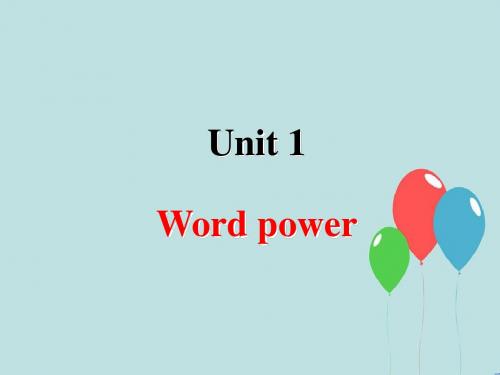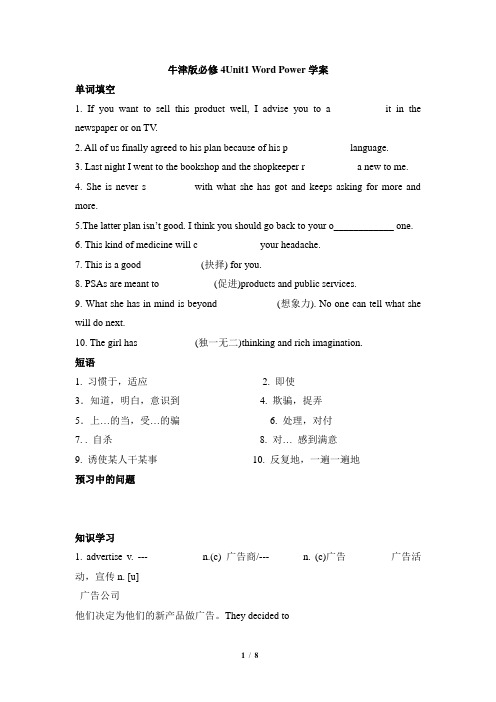牛津高中英语模块四Unit1WordPower
- 格式:pptx
- 大小:865.46 KB
- 文档页数:1




牛津版必修4Unit1 Word Power学案单词填空1. If you want to sell this product well, I advise you to a__________ it in the newspaper or on TV.2. All of us finally agreed to his plan because of his p____________ language.3. Last night I went to the bookshop and the shopkeeper r__________ a new to me.4. She is never s_________ with what she has got and keeps asking for more and more.5.The latter plan isn’t good. I think you should go back to your o____________ one.6. This kind of medicine will c____________ your headache.7. This is a good____________(抉择) for you.8. PSAs are meant to___________(促进)products and public services.9. What she has in mind is beyond____________(想象力). No one can tell what she will do next.10. The girl has ___________(独一无二)thinking and rich imagination.短语1. 习惯于,适应___________________2. 即使____________________ 3.知道,明白,意识到_____________ 4. 欺骗,捉弄______________ 5.上…的当,受…的骗_______________ 6. 处理,对付______________ 7. . 自杀_ _________________________ 8. 对… 感到满意___________9. 诱使某人干某事_________________ 10. 反复地,一遍一遍地______预习中的问题知识学习1. advertise v. ---___________n.(c) 广告商/---______ n. (c)广告_________广告活动,宣传n. [u]广告公司_____________他们决定为他们的新产品做广告。


英语必修4译林牛津Unit 1精品教案(3)Word●Word powerWe’ll learn in this section some common suffixes that can be added to nouns or verbsto create adjectives. And also some vocabulary related to sales and marketing.Step 1: Brainstorming1. Please think about the following questions:How are the following words formed?health (noun) healthy(adjective) interest (verb) interesting (adjective)An English word can have several derivatives. And please pay attention to thefact that many English words share the same root word, even though they have different meanings or parts of speech.Now here’s more example for you to better understand word formation.breath (n.) breathe (v.) breathless (adj.)act (v.) action (n.) actor (n.) actress (n.) activity (n.)possible (adj.) impossible (adj.) possibility (n.) possibly (adv.)friend (n.), friendly (adj.), friendless (adj.), friendship (n.), unfriendly (adj.)As you can see, many words are derived by adding suffixes or prefixes to the root words. Often you may come across unfamiliar words while reading, try to use knowledgeof word formation to guess their meanings. Will you? And can you give more examplesabout word formation?2. Shall we have a competition to see who can give more examples or create mo re wordsby adding suffixes or prefixes to the root words?3. As we know, sometimes an English word can be made up of three parts: a prefix,a stem and a suffix. A stem is the main part of a word. A prefix is a group of lettersadded to the beginning of a word. A suf fix is a group of letters placed at the endof a word. Both prefixes and suffixes modify the meaning of a word or change it intoa different word group. The following is a table of common prefixes:Prefix Meaning Examples (adjectives)un- Not unfair, unnecessary, unimportant,unhappyin- Not incorrect, invisible, incurable,inaccuratedis- showing opposite disable, dishonest, disagree, disappear,discoverre- do again rewrite, redo, rebuild, react, retel l,recreatemis- badly or wrongly misunderstand, misdirect, mistake,misuseStep 2: Learning about Word formationThe basic part of any word is the root; to it, you can add a prefix at the beginning and/or a suffix at the end to change the meaning. For example, in the word "un flatter ing," the root is simply "flatter," while the prefix "un-" makes the word negative, and the suffix "-ing" changes it from a verb into an adjective (specifically, a participle).English itself does not use prefixes as heavily as it once did, but many English words come from Latin, which uses prefixes and suffixes (you can use the word affixto refer either to a prefix or a suffix) quite extensively. For example, the words "prefix," "suffix," and "affix" themselves are all formed from "fix" by the use of prefixes:•"ad" (to) + "fix" (attached) = "affix"•"pre" (before) + "fix" = "prefix"•"sub" (under) + "fix" = "suffix"Note that both the "-d" of "ad" and the "-b" of "sub" change the last letter.Here are some of the most common Latin prefixes (for the meanings of the Latin roots, look up the words in a good dictionary):ab (away) abrupt, absent, absolvead (to) adverb, advertisement, afflictin (not) incapable, indecisive, intolerableinter (between, among) intercept, interdependent, interp rovincialintra (within) intramural, intrapersonal, intraprovincialpre (before) prefabricate, preface preferpost (after) postpone, postscript, postwarsub (under) submarine, subscription, suspecttrans (across) transfer, transit, translateStep 3: Ready used materials for Word formationAffixesMorphemes added to free forms to make other free forms are called affixes. There are three principle kinds of affixes:1.prefixes (at beginning) — "un-" in "unable"2.suffixes (at end) — "-ed" in "walked"3.circumfixes (at both ends) — "en--en" in "enlighten"(These always seem to consist of otherwise attested independent prefixes and suffixes.)A Rule for Forming some English WordsConsider the following pairs of English words:Adjective V erbdark darkenblack blackenred reddensteep steepenWhat generalization (rule) can we make?•Form: "en"•Combination: At the end of Adjectives (suffix) to make Verbs•Meaning: "to make (more) Adjective"We can draw a diagram to show the internal structure of one of the words:Verb/ \Adjective -en|[blackMeaning: "to make (more) black"Likewise we can draw a partial structure (tree diagram) which shows the three properties of rule of combination for the affix:Verb/ \Adjective -enMeaning: "to make (more) Adjective"Zero MorphemesSome affixes consist of no sounds at all. Zero morphemes DO exist, and we'll see why, and illustrate another concep t, allomorphy at the same time.Consider the following words:Adjective V erbyellow yellowbrown browngreen greenpurple purpleThe relation between "yellow" (adjective) and "yellow" (verb) is exactly the same as that between "white" and "whiten", which we just considered. But the form of "yellow" doesn't change. So we say that we added a zero suffix:Verb/ \Adjective -Ø[|yellowMeaning: "to make (more) yellow"Zero morphemes are obviously hard to spot because you can't hear them! In these cases you have to notice what ISN'T there. (Sherlock Holmes solves one of his cases by noticing that a dog DIDN'T bark. This was important because there was a situation where any dog would have barked. This is the kind of thinking you have to do to find zero morphemes.)AllomorphyBut now we have two ways to make Adjectives into Verbs meaning "to make (more) Adjective": "-en" ("black-en") and "-Ø" ("yellow-Ø") How do we know which rule to use? That is, why not "yellow-en"?One possible (but uninteresting) answer is that we just have to memorize which affix to use for each stem. That is, we just memorize that "black" takes "-en" and "yellow" takes "-Ø". But we would like a better explanation.As with the phonology problems, the best place to look is "near" where the affix attaches. Since "-en" is a suffix, let's look at the end of the stems. What we find is that we can divide the Adjectives into two classes based on what the last SOUND (NOT letter) of the stem is:•Use "-en" if the last sound is:[p] "deep-en" [f] "stiff-en" [v] "live-en" [t] "white-en"[d] "redd-en" [s] "less-en" [ʃ] "fresh-en" [k] "dark-en"•Use "-Ø" if the last sound is:[e] "gray-Ø" ("His hair grayed (gra y-Ø-ed) before he was twenty.")[n] "brown-Ø" [m] "dim-Ø" [l] "purple-Ø" [r] "clear-Ø"We can use the same type of diagrams, and indicate the conditions:Verb/ \Adjective -en if Adjective ends in an obstruent (oral stop or fricative)-Ø if Adjective ends in a sonorant (nasals, approximants, vowels) Meaning: "to make (more) Adjective"When we did phon ology problems, we had a notion of "default" or "elsewhere". The same concept can arise in morphology, although in this case the choice is made difficult by the clean cut between obstruents and sonorants. It is true, however, that there are exceptions to this rule with certain unusual adjectives:Verb/ \Adjective/ \un- Adjective/ \Verb -able|tieMeaning: un( able (tie) ) = "can't be tied"The relative scope of "un-" and "-able" is different in these two cases, leading to a difference in meaning. The difference in meaning also correlates with whether "un-" is modifying a verb or an adjective. When a difference in meaning correlates with a difference in structure like this we call this STRUCTURAL AMBIGUITY. Structural ambiguity is a very important concept. We will see exactly the same thing when we analyze sentences.Other ways of Forming Words•Back formationsWhere one "falsely" uses a rule."peddler" refers to a personanalyze "peddler" as "peddle" + "-er"•Blends: "smoke" + "fog" = "smog"; "motor" + "hotel" = "motel"•Words from Names: "jumbo", "sandwich"•Truncation (Clipping): "gym(nasium)", "(tele)phone"Acronyms: "AIDS" = "Acquired Immune Deficiency Syndrome"课后练习Many of us mistakenly believe that it's wrong to think we have any good qualities. We may spend a lot of time blaming ourselves for our negative qualities, thinking that self criticism is the key to improving our performance. However, a constant focus on our supposed shortcomings can stop our efforts to make friends with other people. How can we believe that others could like us if we believe our inner being is flawed (有缺陷)?If someone seems to dislike you, the reason for that dislike might have little or nothing to do with you. The person who doesn't like you might be fearful, or shallow, or busy or shy. Perhaps you and that person are simply a mismatch for each other at this particular time.Don't take yourself out of the game by deciding that your flaws are bigger than your good qualities. In fact, some of the very qualities you consider to be flaws may be irresistible to someone else. For all the factors that might cause one personto reject you, there are at least as many factors that will work in your favor with someone else.You might be thirty pounds over your ideal weight, but you may have a wonderful laugh and a real enthusiasm for life. There are many people who don’t mind your extra pounds. You may drive a shabby car, but you might be a great dancer and a loyal friend. There are people out there lo oking for loyalty, or fun, or sweetness, or wisdom, and the package it comes in is not important. If you are worried that you are not beautiful enough to attract friends, keep in mind that not everyone is looking for physical beauty in their friends. You can decide to feel inferior(自卑) because you don't have much money and you don't drive a nice car. You can believe that this is the reason that you don't have many friends in your life. On the other hand, if you are very wealthy you may be suspicious that everyone is after your money and that nobody really likes you as a person.The point is that you can focus on just about anything and believe it's the reason you do not have friends and cannot make any.36. According to the author ___________ plays an important role in making friends.A. admitting your shortcomingsB. self criticismC. modestyD. confidence【答案】D【解析】推理判断题。